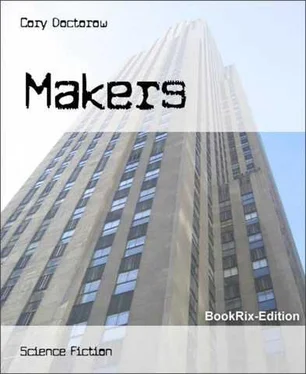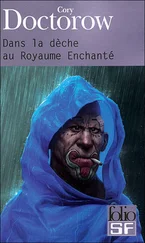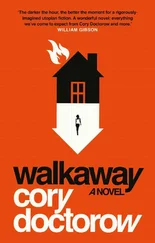Cory Doctorow - Makers
Здесь есть возможность читать онлайн «Cory Doctorow - Makers» весь текст электронной книги совершенно бесплатно (целиком полную версию без сокращений). В некоторых случаях можно слушать аудио, скачать через торрент в формате fb2 и присутствует краткое содержание. Жанр: Фантастика и фэнтези, на английском языке. Описание произведения, (предисловие) а так же отзывы посетителей доступны на портале библиотеки ЛибКат.
- Название:Makers
- Автор:
- Жанр:
- Год:неизвестен
- ISBN:нет данных
- Рейтинг книги:4 / 5. Голосов: 1
-
Избранное:Добавить в избранное
- Отзывы:
-
Ваша оценка:
- 80
- 1
- 2
- 3
- 4
- 5
Makers: краткое содержание, описание и аннотация
Предлагаем к чтению аннотацию, описание, краткое содержание или предисловие (зависит от того, что написал сам автор книги «Makers»). Если вы не нашли необходимую информацию о книге — напишите в комментариях, мы постараемся отыскать её.
Makers — читать онлайн бесплатно полную книгу (весь текст) целиком
Ниже представлен текст книги, разбитый по страницам. Система сохранения места последней прочитанной страницы, позволяет с удобством читать онлайн бесплатно книгу «Makers», без необходимости каждый раз заново искать на чём Вы остановились. Поставьте закладку, и сможете в любой момент перейти на страницу, на которой закончили чтение.
Интервал:
Закладка:
“Chief Brian Wannamaker,” he said. He was her age, with the leathery skin of a Florida native who spent a lot of time out of doors. “I’m afraid I have no comment for you at this time.”
Suzanne kept her face deadpan, and gave Francis’s hand a warning squeeze to keep him quiet. He was trembling now. “I see. You can’t comment, you can’t fight the fire. Is that what you’d like me to write in tomorrow’s paper?”
The Chief looked at the fire for a moment. Across the canal, the bucket-brigaders were losing worse than ever. He frowned and Suzanne saw that his hands were clenched into fists. “Let me make a call, OK?” Without waiting for an answer, he turned on his heel and stepped behind the fire-engine, reaching for his cellphone.
Suzanne strained to hear his conversation, but it was inaudible over the crackle of the fire. When she turned around again, Francis was gone. She caught sight of him again in just a moment, running for the canal, then jumping in and landing badly in the shallow, swampy water. He hobbled across to the opposite bank and began to laboriously climb it.
A second later, Perry followed. Then Lester.
“Chief!” she said, going around the engine and pointing. The Chief had the phone clamped to his head still, but when he saw what was going on, he snapped it shut, dropped it in his pocket and started barking orders.
Now the fire-fighters moved, boiling across the bridge, uncoiling hoses, strapping on tanks and masks. They worked in easy, fluid concert, and it was only seconds before the water and foam hit the flames and the smoke changed to white steam.
The shantytown residents cheered. The fire slowly receded. Perry and Lester had Francis, holding him back from charging into the fray as the fire-fighters executed their clockwork dance.
The steam was hot enough to scald, and Suzanne pulled the collar of her blouse up over her face. Around her were the shantytowners, mothers with small children, old men, and a seemingly endless parade of thug-life teenagers, the boys in miniature cycling shorts and do-rags, the girls in bandeau tops, glitter makeup, and skirts made from overlapping strips of rag, like post-apocalyptic hula outfits. Their faces were tight, angry, smudged with smoke and pinkened by the heat.
She saw the one whose father had reportedly been pushed under a bus by his mother, and he grimaced at her. “What we gonna do now?”
“I don’t know,” she said. “Are you all right? Is your family all right?”
“Don’t got nowhere to sleep, nowhere to go,” he said. “Don’t even have a change of clothes. My moms won’t stop crying.”
There were tears in his eyes. He was all of fifteen, she realized. He’d seemed much older on the roof. She gathered him into her arms and gave him a hug. He was stiff and awkward at first and then he kind of melted into her, weeping on her shoulder. She stroked his back and murmured reassuringly. Some of the other shantytowners looked at the spectacle, then looked away. Even a couple of his homeboys — whom she’d have bet would have laughed and pointed at this show of weakness — only looked and then passed on. One had tears streaking the smoke smudges on his face.
For someone who isn’t good at comforting people, I seem to be doing a lot of it, she thought.
Francis and Lester and Perry found her and Francis gave the boy a gruff hug and told him everything would be fine.
The fire was out now, the firefighter hosing down the last embers, going through the crowd and checking for injuries. A TV news crew had set up and a pretty black reporter in her twenties was doing a stand up.
“The illegal squatter community has long been identified as a problem area for gang and drug activity by the Broward County Sheriff’s office. The destruction here seems total, but it’s impossible to say whether this spells the end of this encampment, or whether the denizens will rebuild and stay on.”
Suzanne burned with shame. That could have been her. When she’d first seen this place, it had been like something out of a documentary on Ethiopia. As she’d come to know it, it had grown homier. The residents built piecemeal, one wall at a time, one window, one poured concrete floor, as they could afford it. None of them had mortgages, but they had neat vegetable gardens and walkways spelled out in white stones with garden gnomes standing guard.
The reporter was staring at her — and naturally so; she’d been staring at the reporter. Glaring at her.
“My RV,” Francis said, pointing, distracting her. It was a charred wreck. He went to the melted doors and opened them, stepping back as a puff of smoke rose from the inside. A fire-fighter spotted it and diverted a stream of water into the interior, soaking Francis and whatever hadn’t burned. He turned and shouted something at the fire-fighter, but he was already hosing down something else.
Inside Francis’s trailer, they salvaged a drenched photo-album, a few tools, and a lock-box with some of his papers in it. He had backed up his laptop to his watch that morning, so his data was safe. “I kept meaning to scan these in,” he said, paging through the photos in the soaked album. “Should have done it.”
Night was falling, the mosquitoes singing and buzzing. The neat little laneways and homey, patchwork buildings lay in ruins around them.
The shantytowners clustered in little groups or picked through the ruins. Drivers of passing cars slowed down to rubberneck, and a few shouted filthy, vengeful things at them. Suzanne took pictures of their license plates. She’d publish them when she got home.
A light drizzle fell. Children cried. The swampy sounds of cicadas and frogs and mosquitoes filled the growing dark and then the streetlights flicked on all down the river of highway, painting everything in blue-white mercury glow.
“We’ve got to get tents up,” Francis said. He grabbed a couple of young men and gave them orders, things to look for — fresh water, plastic sheeting, anything with which to erect shelters.
Lester started to help them, and Perry stood with his hands on his hips, next to Suzanne.
“Jesus Christ,” he said. “This is a fucking disaster. I mean, these people are used to living rough, but this — ” he broke off, waving his hands helplessly. He wiped his palms off on his butt, then grabbed Francis.
“Get them going,” he said. “Get them to gather up their stuff and walk them down to our place. We’ve got space for everyone for now at least.”
Francis looked like he was going to say something, then he stopped. He climbed precariously up on the hood of Lester’s car and shouted for people to gather round. The boys he bossed around took up the call and it wasn’t long before nearly everyone was gathered around them.
“Can everyone hear? This is as loud as I go.”
There were murmurs of assent. Suzanne had seen him meet with his people before in the daylight and the good times, seen the respect they afforded to him. He wasn’t the leader, per se, but when he spoke, people listened. It was a characteristic she’d encountered in the auto-trade and in technology, in the ones the others all gravitated to. Charismatics.
“We’ve got a place to stay a bit up the road for tonight. It’s about a half hour walk. It’s indoors and there’s toilets, but maybe not much to make beds out of. Take what you can carry for about a mile, you can come back tomorrow for the rest. You don’t have to come, but this isn’t going to be any fun tonight.”
A woman came forward. She was young, but not young enough to be a homegirl. She had long dark hair and she twisted her hands as she spoke in a soft voice to Francis. “What about our stuff? We can’t leave it here tonight. It’s all we’ve got.”
Francis nodded. “We need ten people to stand guard in two shifts of five tonight. Young people. You’ll get flashlights and phones, coffee and whatever else we can give you. Just keep the rubberneckers out.” The rubberneckers were out of earshot. The account they’d get of this would come from the news-anchor who’d tell them how dangerous and dirty this place was. They’d never see what Suzanne saw, ten men and women forming up to one side of the crowd. Young braves and homegirls, people her age, their faces solemn.
Читать дальшеИнтервал:
Закладка:
Похожие книги на «Makers»
Представляем Вашему вниманию похожие книги на «Makers» списком для выбора. Мы отобрали схожую по названию и смыслу литературу в надежде предоставить читателям больше вариантов отыскать новые, интересные, ещё непрочитанные произведения.
Обсуждение, отзывы о книге «Makers» и просто собственные мнения читателей. Оставьте ваши комментарии, напишите, что Вы думаете о произведении, его смысле или главных героях. Укажите что конкретно понравилось, а что нет, и почему Вы так считаете.








